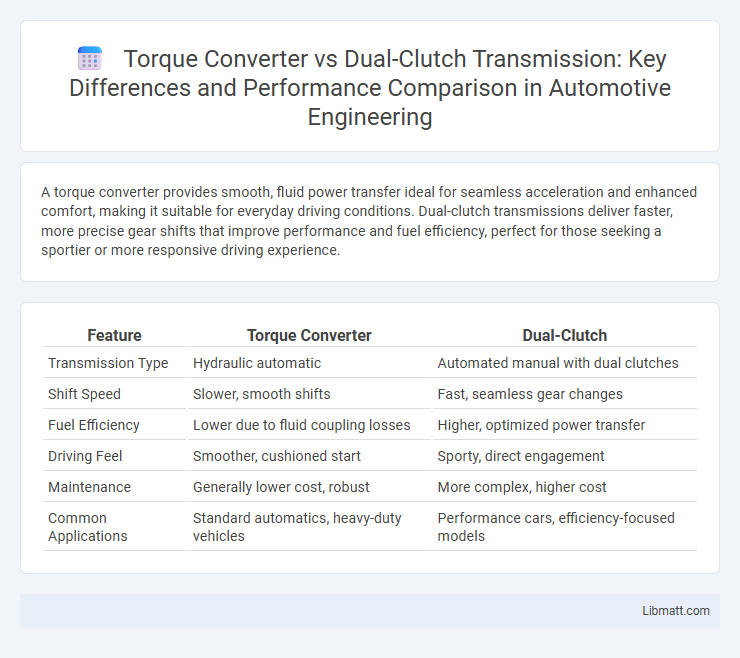A torque converter provides smooth, fluid power transfer ideal for seamless acceleration and enhanced comfort, making it suitable for everyday driving conditions. Dual-clutch transmissions deliver faster, more precise gear shifts that improve performance and fuel efficiency, perfect for those seeking a sportier or more responsive driving experience.
Table of Comparison
| Feature | Torque Converter | Dual-Clutch |
|---|---|---|
| Transmission Type | Hydraulic automatic | Automated manual with dual clutches |
| Shift Speed | Slower, smooth shifts | Fast, seamless gear changes |
| Fuel Efficiency | Lower due to fluid coupling losses | Higher, optimized power transfer |
| Driving Feel | Smoother, cushioned start | Sporty, direct engagement |
| Maintenance | Generally lower cost, robust | More complex, higher cost |
| Common Applications | Standard automatics, heavy-duty vehicles | Performance cars, efficiency-focused models |
Overview: Torque Converter vs Dual-Clutch
Torque converters utilize a fluid coupling mechanism to transfer engine power smoothly, offering seamless acceleration and improved drivability in automatic transmissions. Dual-clutch systems employ two separate clutches for odd and even gears, enabling faster gear shifts and enhanced fuel efficiency through direct power engagement. Both transmission types serve distinct performance and efficiency goals, with torque converters favoring comfort and dual-clutch systems prioritizing sportier responsiveness.
Fundamental Working Principles
The torque converter transmits engine power to the transmission using a fluid coupling that multiplies torque through a turbine and stator assembly, enabling smooth acceleration without direct mechanical connection. Dual-clutch transmissions utilize two separate clutches to alternate between odd and even gear sets, allowing seamless and rapid gear shifts by pre-engaging the next gear before release. This fundamental difference results in torque converters favoring smoothness and ease of use, while dual-clutch systems optimize shifting speed and fuel efficiency.
Key Components and Mechanism
Torque converters feature a fluid coupling with a pump, turbine, and stator that transmit engine power smoothly through hydraulic fluid. Dual-clutch transmissions use two separate clutches for odd and even gear sets, allowing seamless and rapid gear shifts by pre-engaging the next gear. The torque converter's hydraulic mechanism provides torque multiplication, while the dual-clutch mechanism relies on direct mechanical engagement for faster response and efficiency.
Performance and Responsiveness
Dual-clutch transmissions offer superior performance and responsiveness due to their ability to pre-select gears and provide near-instantaneous shifts, resulting in smoother acceleration and reduced power loss. Torque converters, while delivering smooth and reliable power transfer, generally exhibit slower shift times and less direct connection between engine and wheels, which can diminish overall responsiveness. High-performance vehicles often favor dual-clutch systems for precise gear changes and enhanced driving dynamics, whereas torque converters remain prevalent in everyday driving scenarios for their durability and comfort.
Fuel Efficiency Comparison
Dual-clutch transmissions typically offer better fuel efficiency compared to torque converters due to their ability to shift gears faster and with less power loss. Torque converters tend to consume more fuel because of the fluid coupling that causes slippage and energy dissipation during gear changes. Recent advancements in dual-clutch systems enhance fuel economy by reducing mechanical drag and improving shift precision, making them a preferred choice for efficiency-focused vehicles.
Driving Experience and Comfort
Torque converters provide smoother and more comfortable driving experiences by gently managing power transmission, ideal for stop-and-go traffic and relaxed cruising. Dual-clutch transmissions deliver quicker, more precise gear shifts that enhance sporty performance and responsiveness but can feel less smooth at low speeds. Your choice between these systems affects ride comfort and driving dynamics, with torque converters favoring comfort and dual-clutch focusing on performance.
Maintenance and Reliability
Torque converters require periodic fluid changes to maintain hydraulic efficiency and prevent overheating, making regular maintenance essential for longevity. Dual-clutch transmissions (DCT) utilize complex electronic components and clutches that necessitate careful monitoring and occasional clutch replacements to ensure optimal performance. While torque converters offer proven durability with fewer sensitive parts, DCTs provide quicker shifts but can experience higher wear without timely maintenance, impacting overall reliability.
Cost Implications
Torque converters generally involve lower upfront costs due to simpler design and manufacturing processes, making them more budget-friendly for standard vehicles. Dual-clutch transmissions, while offering faster gear shifts and improved fuel efficiency, come with higher production and maintenance expenses, impacting your overall cost of ownership. Choosing between the two depends on balancing initial investment against long-term performance benefits and service requirements.
Suitability for Different Vehicles
Torque converters suit heavier vehicles like trucks and SUVs by providing smooth torque multiplication and better load handling at low speeds. Dual-clutch transmissions excel in sports cars and compact vehicles, delivering faster gear shifts and improved fuel efficiency for performance-oriented driving. Your choice depends on vehicle type, driving style, and priorities between smooth power delivery and responsiveness.
Pros, Cons, and Final Recommendations
Torque converters offer smoother acceleration and better traction control, making them ideal for everyday driving and off-road conditions, but they tend to be less fuel-efficient and slower to respond compared to dual-clutch systems. Dual-clutch transmissions provide faster gear shifts and improved fuel economy, perfect for performance enthusiasts and vehicles requiring quick responsiveness, though they can be more complex and costly to repair. Your choice depends on prioritizing comfort and durability versus speed and efficiency, with torque converters suiting relaxed driving and dual-clutch units favoring sporty performance.
Torque converter vs Dual-clutch Infographic

 libmatt.com
libmatt.com